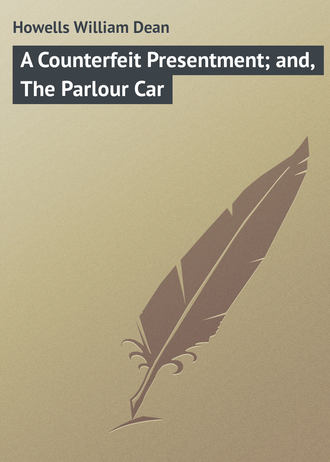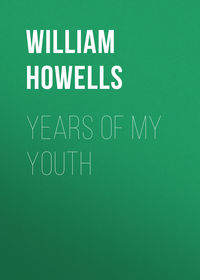 полная версия
полная версияA Counterfeit Presentment; and, The Parlour Car
General Wyatt.– "Not on any account." He gently withdraws from her the newspaper she has taken up. "That is truly a kindness that kills. Open my papers for me? I'd as lief you'd put on my hat for me, my dear."
Bartlett.– "That is the one thing that can't be done for any man!"
Constance.– "Why not? A woman can put on another woman's bonnet for her."
General Wyatt.– "Ah, that's a different thing. A man doesn't wear his hat for looks."
Constance.– "That's true, papa, —some of them." She turns gaily from her father, and looks up at Bartlett, who has smilingly listened. She gives a start, and suppresses a cry; she passes her hand quickly over her eyes, and then staying herself a moment with one hand on the back of a chair resumes with forced calm: "Shall we begin, now – ah – Mr. – Bartlett?" An awkward silence ensues, in which Bartlett remains frowning, and the General impatiently flings open a newspaper. Then Bartlett's frown relaxes into a compassionate response to her appealing look.
Bartlett.– "Yes, I'm quite ready. But it's you who are to begin, Miss Wyatt. I am to assume the safe and eligible position of art critic. I wish I had some of those fellows who write about my pictures before an easel; I'd stand their unpleasant company a while for the sake of taking the conceit out of them. Not but what my pictures are bad enough, – as bad as any critic says, for that matter. Well, Miss Wyatt; here is the charcoal, and yonder out-doors is the mountain."
Constance.– "Excuse me a moment. Papa, will our talking disturb you?" To Bartlett: "I suppose we will have to talk a little?"
Bartlett.– "A little."
General Wyatt, from behind his paper. – "It won't disturb me if you don't talk to me."
Constance.– "We'll try not." To Bartlett: "Well?"
Bartlett, as Constance places herself before the canvas, and receiving the charcoal from his fingers, glances out at Ponkwasset. – "May I ask why you chose such a capacious canvas?"
Constance, in meek surprise. – "Why, the mountain being a large object" —
Bartlett.– "A large canvas was necessary, I see. There's reason in that. But were you going to do it life size?"
Constance, as before. – "Why, no!"
Bartlett.– "What was your idea?"
Constance.– "I don't know. I thought – I thought I would have the mountain in the back-ground, with some clouds over it, and a few figures in the foreground, to give it a human interest."
Bartlett.– "Yes, that's a good notion. Well, now begin. First get your distance – No; better strike in a horizon line first. That will keep you right. Draw the line straight across the middle of the canvas." Constance retires a few steps from the canvas, measures its spaces with her eye, and then with a glance at the horizon outside draws. Bartlett, looking over her shoulder: "Straight, straight! The line should be straight. Don't you see?"
Constance, falteringly. – "I meant that for a straight line."
Bartlett.– "Oh! well! Yes! I see. However, now you've got it in, hadn't you better use it for a curved line? Say for that wavering outline of the hills beyond Ponkwasset?"
Constance.– "Why, if you think so, Mr. Bartlett."
Bartlett.– "And I'll just strike in the horizon line here." He draws rapidly, steps back a pace, approaches, and touches Constance's line at different points. Then he gives her the chalk again. "Now, scratch in the outline of Ponkwasset." Constance begins to draw. "Ah! Wait a moment, please. You're not quite getting it. Will you let me?" Constance offers him the charcoal, which he declines with a gesture, "No, no! You must do it. I meant" —
Constance.– "What?"
Bartlett.– "That if you would allow me to – to – guide your hand" —
Constance, frankly. – "Why, of course. Do what you like with it" —
Bartlett.– "Oh!"
Constance.– "So that you teach it a little of the skill of yours." He gently, and after some delicate hesitations, takes her hand, as it grasps the charcoal, and slowly guides it in forming the outline of the mountain. Constance, in admiration of his cleverness: "What a delicious touch you have!"
Bartlett, confusedly. – "Yes?"
Constance, regarding the outline after he has released her hand, while Bartlett, with a gesture of rapturous fondness, looks at the fingers that have guided hers, and tenderly kisses them. – "Oh, yes: I'd give anything if I had your hand!"
Bartlett.– "It's at your service always, Miss Wyatt."
Constance, still regarding the picture. – "Ah, but I should need your mind, too!"
Bartlett.– "Well?"
Constance.– "I couldn't rob you of everything." She begins to draw again, and then, in pretty, unconscious imitation of Bartlett, throws back her head.
Bartlett, breaking forth in rapture at her movement and attitude. – "Oh, divine!"
Constance, innocently beaming upon him. – "Do you think so? I didn't suppose I could get it so at once. Is it really good?"
Bartlett, recalled to himself. – "Who? What? Yes, yes; it isn't bad. Not at all bad. That is" —
Constance, disappointedly. – "I thought you liked it." Gravely: "Why did you say it was divine?"
Bartlett.– "Because – I – I – thought so!"
Constance, with mystification. – "I'm afraid I don't understand. Shall I let this outline remain for Ponkwasset, or shall I use it for something else?"
Bartlett.– "Yes, let it remain for Ponkwasset; if it needs changing that can easily be done afterwards. Now block out your middle distance. So!" He takes the charcoal from her and draws. "Now, then, sketch in your figures."
Constance, timidly. – "How large shall I make them?"
Bartlett.– "Oh, as large as you like. How large did you think?"
Constance.– "I don't know. About a foot high."
Bartlett.– "Well, try them." Constance draws, and Bartlett regards the operation with gestures and contortions of countenance expressive of mingled tenderness for Constance and extreme suffering from her performance. She turns about, and surprises him with his hands clutched in his shaggy hair.
Constance, with dignity. – "What is the matter, Mr. Bartlett?"
Bartlett, forcing an imbecile smile. – "Nothing, I was just thinking – I should – like to venture to make a remark."
Constance.– "You know I wish you to speak to me about everything."
Bartlett.– "Did you mean that lady to be in the middle distance?"
Constance.– "Yes."
Bartlett.– "Well, there is a slight, a very slight, error in the perspective. She is as tall as Ponkwasset, you see, and could touch the top of it with the point of her parasol."
Constance, dejectedly. – "I see. I can never do it."
Bartlett.– "Oh, yes, you can, Miss Wyatt; you mustn't lose patience with me."
Constance.– "It's you who won't be able to keep your patience with my stupidity."
Bartlett.– "That's not the name for it. I shall think more of your failures than of anybody's successes – that is– I mean – if you don't let this thing be a pain instead of a pleasure to you. Remember, I hoped it would amuse you."
Constance.– "Oh, yes. You have been only too kind, in that and everything."
Bartlett.– "Well, now, let us begin again. This lady is very well as a lady; you understand the figure better than perspective; but she's out of place here, a little; and a flower out of place, you know, is a weed. Suppose we" – he takes up the charcoal, and makes a few dashes at the canvas – "treat her as a clump of tall birch-trees, – that clump over there in the edge of the meadow; that will bring her into the foreground, and entitle her to be three inches high; we can't really allow her more, even as a clump of birches. Eh?"
Constance.– "Oh, yes; that's better, decidedly." Smiling: "Being under instruction, this way, makes me think of my school-days."
Bartlett, impressively. – "I hope they were happy days."
Constance.– "Oh, the happiest of my life."
Bartlett.– "I am so glad." Constance stares at him in surprise, but finally says nothing. "I mean since this is like them."
Constance, pensively. – "Yes, it's pleasant to go back to that time." With more animation: "Papa, I wonder if you remember Madame Le May, who used to teach me French when you came home after the war?"
General Wyatt, behind his newspaper. – "Eh? What? What's that? Some difficulty in the drawing? You must both have patience, – patience" —
Constance.– "Why, papa! Oh, well, I won't worry him. I suppose he's found something about cutting down the army appropriations; that always absorbs him. What shall I try next, Mr. Bartlett?"
Bartlett.– "You can rub in your middle distance."
Constance, laughing. – "I'll try. But I think I should be at my best beyond the vanishing point."
Bartlett.– "Oh, I don't believe that! Perhaps it annoys you to have me looking over your shoulder while you work?"
Constance.– "No. Oh, no."
Bartlett.– "I see that it does."
Constance.– "It makes me a little nervous. I'm afraid of you, you know."
Bartlett.– "I didn't know I was so terrible. How far off shall I go, to be agreeable?"
Constance, laughing. – "Across the room."
Bartlett.– "Shall you like me better at that distance?"
Constance.– "I can't let you make a joke of our liking for you."
Bartlett.– "You defend me, even in my presence. What kindness I must miss when I'm absent! Well, I will go and see what interests General Wyatt."
General Wyatt.– "Madame Le May? Yes, certainly. Remember her perfectly. False hair, false teeth, false" —
Constance.– "Why, what are you talking of, papa?"
General Wyatt.– "Mayo. Capital cavalry officer – cutting down the pay of such a man" —
Constance.– "What are you reading?" The General makes no answer.
Bartlett.– "Don't disturb him. I'll walk off here at this end of the room." He paces softly up and down, while Constance returns to her drawing, to which she diligently applies herself. A thought seems to strike Bartlett as his wandering eye falls upon General Wyatt, who still sits with his head buried in his newspaper. He approaches, and remarks in a low tone: "I believe I will take a cigar now, Gen – " The newspaper falls slightly, and Bartlett makes a discovery. The General has dropped off into a doze. With a gesture of amusement, Bartlett restores the paper to its place, and resumes his walk in a quiet rapture, interrupting it now and then to dwell in silent adoration on the young lady's absorption in the fine arts.
Constance.– "Mr. Bartlett" —
Bartlett, halting. – "Recalled from exile already? Well?"
Constance.– "I'm afraid I can't get by this point alone."
Bartlett.– "Yes? Let's see it." He eagerly crosses the room, takes his stand behind her, and throws up his hands in despair. Constance indicates her difficulties.
Constance.– "The question is how to get in some idea of those slopes of the mountain. These things seem to crowd everything out."
Bartlett, hopelessly regarding the work. – "I see. You have been composing a little, – idealising. Well, I don't object to that. Though perhaps it had better come later. This long stretch of rocky cliff" —
Constance.– "Rocky cliff?"
Bartlett.– "Isn't in nature, but it might have a good effect if properly utilised" —
Constance.– "But it isn't rocky cliff, Mr. Bartlett. It's" —
Bartlett, looking a second time, and more closely. – "Why, of course! It's that stretch of broken woodland at the foot of the mountain. Very good; very good indeed; very boldly treated. Still, I should say" —
Constance, in desperation. – "Oh, Mr. Bartlett, it isn't rocks, and it isn't woods; it's —hay-stacks!"
Bartlett.– "Hay-stacks?"
Constance, desolately. – "Yes, hay-stacks."
Bartlett.– "But hay-stacks at the foot of the mountain, Miss Wyatt" —
Constance, inconsolably. – "They're not at the foot of the mountain. They're those hay-stacks, just out there in the meadow. I thought it would be nice to have them in near that clump of birches you drew."
Bartlett.– "Oh-h-h-h!" He scratches his head in visible stupefaction. Then with reanimation: "I see. It was my error. I was looking for middle distance, and you had been working on the foreground. Very good; very – Oh, gracious powers – No, no! Don't be discouraged, Miss Wyatt; remember it's the first time you've attempted anything of the sort, and you've really done very well. Here!" He seizes the pencil and draws. "We will just sink these hay-stacks, – which are very good in their way, but not perhaps sufficiently subordinated, – just sink them into the lake yonder. They will serve very well for the reflections of those hills beyond, and now you can work away at some of the details of the foreground; they will interest you more." He retires a pace. "It's really not a bad start as it is."
Constance, ruefully. – "But it's all yours, Mr. Bartlett."
Bartlett.– "Eh?"
Constance.– "You drew every line in it."
Bartlett.– "No, you drew the line of the distant hills."
Constance.– "But I didn't mean it for that!"
Bartlett.– "Well, well; but the lady's figure, that was good" —
Constance.– "You turned her into a clump of birches."
Bartlett.– "True. A mere exigency of the perspective. The hay-stacks" —
Constance.– "You've just sunk them into the lake!"
Bartlett.– "Well, well. Perhaps I may have helped in the execution of the picture, a little. But my dear Miss Wyatt, the drawing is nothing; it's the design is what makes the picture, and that's entirely yours; the ideas were all yours. Come! Try your hand now at the shore line of the lake, just here."
Constance.– "I'm afraid I'm a little tired. My hands are cold."
Bartlett.– "Oh, I'm sorry!" He takes one of them and places it between either of his. "That shows you've been working too hard. I can't allow that. All the art in the world isn't worth – I mustn't forget that you have not been well; and I want these little lessons to be a pastime and not a burden to you. The picture's sufficiently advanced now" – he mechanically puts her hand under his left arm, and keeps his own right hand upon it, while he takes his station with her in front of the easel – "to warrant us in trying a little colour to-morrow. You'll be very much more interested in colour. It is refreshing to get at the brushes after you've tired yourself out with the black and white. You've got a very pretty outfit, there, Miss Wyatt." He indicates her colours on the little table.
Constance.– "I didn't mean to refuse the offer of your paints, but I thought it would be better to have the colours perfectly fresh, you know."
Bartlett.– "Quite right. Quite right. Now you see – Rest on me, Miss Wyatt, or I shall be afraid of fatiguing you by standing; and I'd like to point out a few things for you to begin on here to-morrow."
Constance.– "Oh, I'm not very tired. But I will keep your arm if you will let me."
Bartlett, making her sustain her weight more distinctly on his arm. – "By all means. Now, here, at this point, I think I'd better sketch you in that old oak down there at the foot of our hill, with its grape-vine, and you can work away at these without reference to Ponkwasset. The line of that clinging vine is one of the most graceful things that Nature – and Nature does know a thing or two, Miss Wyatt; she's particularly good at clinging vines – ever drew." He looks at her over his shoulder with an involuntary sigh. Then, "Suppose" – he takes up the charcoal – "I do it now. No, don't disturb yourself." They lean forward, and as he sketches, their faces, drawn together, almost touch. Bartlett drops the pencil, and starts away, releasing his arm: "Oh, no, no!"
Constance, simply. – "Can't you do it?"
Bartlett, in deep emotion. – "No, no; I can't do it – I mustn't – it would be outrageous – I – I" – Regaining his self-possession at sight of Constance's astonished face: "You said yourself just now that I had drawn everything in the picture. I can't do any more. You must do the clinging vine!"
Constance, innocently. – "Very well, I'll try. If you'll do the oak for me. I'll let you do that much more." They regard each other, she with her innocent smile, he with a wild rapture of hope, doubt, and fear. Then Bartlett draws a long, despairing sigh, and turns away.
Bartlett.– "To-morrow, to-morrow!" He walks away, and returns to her. "Have you read – have you ever read The Talking Oak, Miss Wyatt?"
Constance.– "Tennyson's? A thousand times. Isn't it charming?"
Bartlett.– "It's absurd, I think. Do you remember where he makes the oak say of the young lady, —
'And in a fit of frolic, mirthShe strove to span my waist:…I wish'd myself the fair young beechThat here beside me stands,That round me, clasping each in each,She might have lock'd her hands'?"Constance.– "Why, that's lovely, – that attribution of human feeling to the tree. Don't you think so?"
Bartlett, absently. – "Yes, yes; beautiful. But it's terrible, too; terrible. Supposing the oak really had human feeling; or supposing that a man had been meant in the figure of an oak" – He has drawn near Constance again; but now he retreats. "Ah, I can't work out the idea."
Constance.– "What idea? I can't imagine what you mean."
Bartlett.– "Ah! I can. My trouble is, I can't say what I mean! This was sometime a paradox."
Constance.– "Oh! I should think, a riddle."
Bartlett.– "Some day I hope you'll let me read it to you."
Constance.– "Why not now?"
Bartlett, impetuously. – "If you only meant what you said, it would be – so much better than if I said what I meant!"
Constance.– "You are dealing in mysteries to-day."
Bartlett.– "Oh, the greatest of them! But don't mind. Wait! I'll try to tell you what I mean. I won't make you stand, while I talk. Here!" He wheels up in front of the picture one of the haircloth sofas; Constance mechanically sinks down upon it, and he takes his place at her side; she bends upon him a look of smiling amusement. "I can put my meaning best, I think, in the form of allegory. Do you like allegory, Miss Wyatt?"
Constance.– "Yes. That is, not very much."
Bartlett. – "Oh! You don't like allegory! Upon second thoughts, I don't myself. We will not try allegory. We will try a supposed case. I think that's always the best way, don't you?"
Constance.– "No, I don't like any sort of indirection. I believe the straightforward way is the best."
Bartlett.– "Yes, so do I; but it's impossible. We must try a supposed case."
Constance, laughing. – "Well!"
Bartlett.– "Ah! I can't say anything if you laugh. It's a serious matter."
Constance, with another burst of laughter. – "I should never have thought so." With a sudden return of her old morbid mood: "I beg your pardon for laughing. What right have I to laugh? Go on, Mr. Bartlett, and I will listen as I should have done. I am ashamed."
Bartlett.– "No, no! That won't do! You mustn't take me so seriously as that! Oh, Miss Wyatt, if I could only be so much your friend, your fool, – I don't care what, – as to banish that look, that tone from you for ever!"
Constance.– "Why do you care?"
Bartlett.– "Why do I care?"
Constance.– "Yes. Why should you mind whether so weak and silly a thing as I is glad or sad? I can't understand. Why have you had so much patience with me? Why do you take all this trouble on my account, and waste your time on me? Why" —
Bartlett, starting up. – "Why do I do it?" He walks away to the other side of the room with signs of great inward struggle; then he swiftly returns to her side where she has risen and stands near the sofa, and seizes her hand. "Well, I will tell you why. No, no! I can't! It would be" —
General Wyatt, behind his newspaper. – "Outrageous! Gross violation of good faith! Infernal shame!" The General concludes these observations with a loud, prolonged, and very stertorous respiration.
Constance, running to him. – "Why, papa, what do you mean? Oh poor papa! He's asleep, and in such a wretched position!" From which she hastens to move him, while Bartlett, recovering from the amaze in which the appositeness of the General's remarks had plunged him, breaks into a harsh "Ha! ha!" Constance turns and advances upon him in threatening majesty: "Did you laugh, Mr. Bartlett?"
Bartlett, after a moment's dismay. – "Well, I don't know whether you call it laughing. I smiled."
Constance, with increasing awfulness: "Why did you laugh, Mr. Bartlett?"
Bartlett.– "I – I – I can't say."
Constance.– "You were laughing at General Wyatt!"
Bartlett.– "Was there nothing to laugh at?"
Constance.– "For children! For vulgar, silly boys! For a gentleman, nothing!"
Bartlett, with rising wrath. – "Then I have no excuse, unless I say that I am no gentleman."
Constance.– "I shall not dispute you in anything; and I will leave you to the enjoyment of your mirth."
Bartlett.– "Very well. As you like. I am sorry to have offended you. I shall take care never to offend you again." Constance sweeps towards one door, at the threshold of which she pauses to look round and see Bartlett dashing her box of colours together as if it were his own, and thrusting it under his arm, seizing with a furious hand the canvas on the easel and his coat from the chair-back, and then rushing from the room. She drops her face into her hands and vanishes, and the next moment Mrs. Wyatt enters.
IVMrs. Wyatt and General WyattMrs. Wyatt.– "What is the matter with Constance, James? Have you been" – She goes up to the General and discovers his vigilance: "Asleep!" Waking him: "James, James! Is this the way you do the dragon, as you call it?"
General Wyatt, starting awake: "Dragon? Dragon? What dragon? I dreamt I was a perfect fiery dragon, and went about breathing flame and smoke. How long have I slept, Margaret? Where is Mr. Bartlett? Where is Constance?"
Mrs. Wyatt.– "Oh, you may well ask that, James. I just met Constance at the door, in tears. Oh, I hope nothing dreadful has happened."
General Wyatt.– "Nonsense, Margaret. Here, help me up, my dear. My nap hasn't done me any good. I'm stiff all over."
Mrs. Wyatt, anxiously. – "I'm afraid you have taken cold, James."
General Wyatt, with impatience. – "Cold? No! Not in the least. I'm perfectly well. But that was a very unpleasant dream. Margaret, I'm afraid that I breathed rather – explosively, at one time."
Mrs. Wyatt.– "Oh, James, this is worse and worse. It must have mortified Constance, dreadfully."
General Wyatt, taking his wife's arm, and limping from the scene: – "Well, well! Never mind! I'll make it right with Bartlett. He's a man of sense, and will help me laugh it off with her. It will be all right, Margaret; don't worry over a trifle like that."
Mrs. Wyatt, as they disappear: – "Trifle? Her whole happiness may depend upon it." At the instant of their withdrawal, Constance and Bartlett, hastily entering by opposite doors, encounter each other in the middle of the room.









